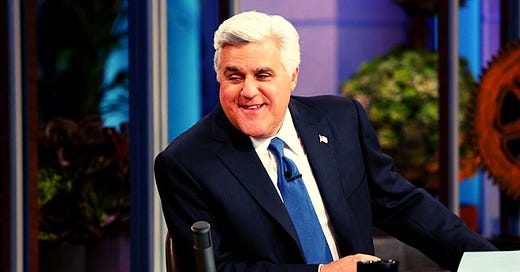
Former Tonight Show host Jay Leno made some political news earlier this week in an appearance on NBC's Today. When asked if he missed his television hosting duties, Leno answered with an unequivocal no.
"It's different," he added, referring to our uncivil political landscape. "I don’t miss it. You know, everything now is, if people don’t like your politics they – everyone has to know your politics.”
Leno explained that it's "tough" to be an effective late-night comedy host when people see you as "one-sided." He pointed out that when he was at the helm, he tried to follow Johnny Carson's lead with bi-partisan humor, where viewers weren't quite sure where he stood politically — and perhaps more importantly, they didn't care.
"Because, you know, the theory when we did the show was: you just watch the news, we’ll make fun of the news, and get your mind off the news, " said Leno. "Well, now people just want to be on the news all the time. You just have one subject that’s the same topic every night, which makes it – makes it very hard. I mean, all the comics, Jimmy and Colbert and everybody else, it’s tough when that’s the only topic out there."
While some would argue that Leno wasn't quite as down the center during his Tonight Show tenure as he now portrays himself, there's no doubt that he was far less political than his primary competition, David Letterman, who Leno decimated in the ratings for many years. And when Jimmy Fallon replaced Leno in 2014, the former Saturday Night Live cast member's avoidance of political partisanship proved successful as well. His lighthearted, optimistic approach to comedy handily beat both ABC's Jimmy Kimmel and CBS's Stephen Colbert in the ratings.
But it didn't last.
The era of Trump ushered in a much deeper and often mean-spirited focus on politics. And shortly after the presidential inauguration in 2017, Stephen Colbert (a committed liberal and fierce vocal critic of the president) jumped ahead in the ratings (where he has dominated ever since). Kimmel turned fiercely political as well, sometimes using his late-night platform to issue sanctimonious denunciations of Trump, Republicans, and conservatives. And Fallon, who has admitted in the past to not even caring all that much about politics, has been sharpening his political blows to keep up.
This would indicate that Leno was right when he suggested that late night hosts are just catering to the times — aka giving the audience what it wants. And in this respect, what those shows are doing isn't all that different than what the cable news networks have done for some time: tailor their products to appeal to an increasingly tribal grievance culture.
While there are plenty of people — including political pundits — who agree with Leno, I do think there's an additional factor at play here.
Yes, today's politics are highly divisive, and a lot of national news stories reflect that. Our eternally combative, truth-challenged, reality-show president (backed by an intensely loyal political following) clashes every day with his often unhinged and ideological political opponents — opponents that include a reflexively hostile mainstream media that seem incapable of covering him fairly or objectively.
But it seems to me that there is still a huge demand, especially in such polarizing times, for broadcast entertainment that isn't so ridiculously dependent on politics. I mean, it's not like prime-time network shows, cable entertainment shows, and streaming entertainment shows (like the ones we enjoy on Netflix and Amazon Prime) are suffering from not being overtly political.
Why must the late-night stuff be different?
I have a theory that the shift to a more politically partisan late-night culture is more an issue of ease than it is a programming adjustment to meet the evolving demand of consumers.
Could it be that the current kings of late night — wait for it — just aren't that funny? Could it be that the political theatrics and our cultural divide serve as a metaphorical crutch for the comedic shortcomings of these hosts and their writers?
Don't get me wrong. Colbert displayed a knack for political comedy in his years on Comedy Central, and he enjoyed a good amount of success from it. Kimmel has a certain wit about him, and — though I've personally never been a fan — people seem to think that Fallon is good at sketch comedy. That's all fine and good, but this current crew sorely lacks the natural comedic talent that their predecessors had an abundance of.
Sorry, but it's true.
Additionally, Carson had folksy charm that ingratiated himself to viewers on a personal level. Letterman (before he turned bitter) was extraordinarily creative and unconventional. Leno, though he wasn't as talented as Carson and Letterman, had an authentic good-naturedness about him that appealed to a wide spectrum of viewers.
But again, more importantly, they were funnier and more welcoming than the people we see now. They didn't need an outrageous political environment in order to draw viewers.
So while I think Leno is right in that today's late-night scene is a reflection of a politically and culturally divided nation, he's being far too charitable to today's hosts and writers who've taken advantage of the situation. Leno, Carson, and Letterman brought people together though comedy, and they did it by being funny and inviting. Unlike today's crew that channels societal angst, they diffused it. And that type of thing takes real talent.
Relying on partisan politics for ratings isn't "tough," as Leno suggested. It's actually quite easy. Much easier than comedy, in fact. And that's why those who are ill-equipped to produce broad, quality humor are under so much pressure to go the political route. It's the path of least resistance in times like these.
America still has a collective sense of humor. The late-night players just don't have what it takes to appeal to it.
---





